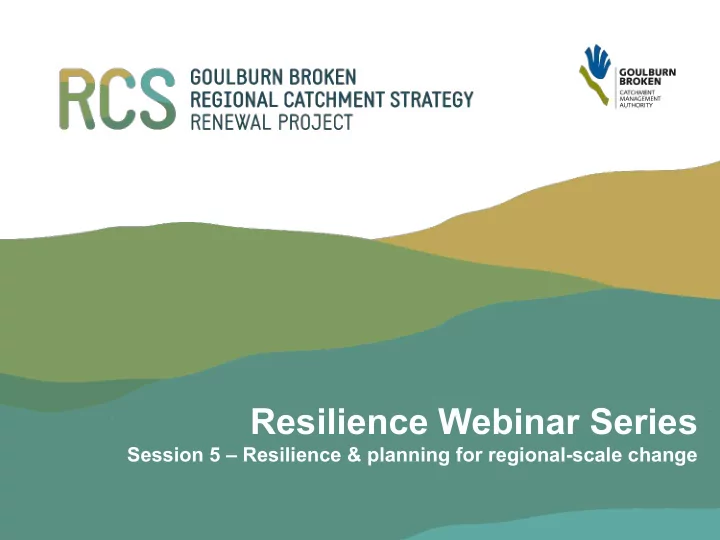

Resilience Webinar Series Session 5 – Resilience & planning for regional-scale change
Overview • Linking webinar content to RCS process • Evolution of natural resource planning in GB • Update on the RCS renewal process/resilience • Next steps in process • Invitation for your involvement
Resilience is the capacity of a system to cope with change and continue to develop in a desired way
Goulburn Broken CMA’s resilience journey
GB CMA – The ride to resilience Ecosystems services (2000’s) Integrated Catchment Management (mid 90’s ) Single Threats (late 1980’s)
Resilience at the GB CMA - The early days • Resilience Assessment – Resilience, Adaptability and Transformability in the GB Catchment • Irrigations Futures
2013 Regional Catchment Strategy
Apply, learn, adapt……… Climate Change Adaptation Planning
Apply, learn, adapt……… Social- Ecological System Planning
Using resilience to guide strategic planning
Resilience framework • https://wayfinder.earth/ • Series of phases & activities • Adapted to meet government guidelines & resources
GB RCS renewal project plan Align to resilience framework Project Stage Project Stage Key Project Activities No. Gather background info & resources to guide Renewal 1 Foundational Activities process Develop project plan & governance arrangements. 2 Building a coalition for change Creating a shared understanding of the Catchment & Initial stakeholder engagement; GB socio-economic 3 Current exploring system dynamics analysis & theme-based background papers. Capacity building activities in resilience thinking; technical focus 4 Broadening our collective knowledge advisory groups; GB Insights Paper & background communication materials. Broader stakeholder engagement & determine Action 5 Developing innovative strategies for change Pledges with partners. 6 Developing a plan for collective action Draft GB RCS. Providing opportunities for input & increasing Public engagement campaign (with tailored products to 7 target key groups) & online survey. community understanding Tailoring the plan to meet community aspirations & Revise GB RCS based on public feedback & GB CMA Board 8 endorse GB RCS. needs Collaborative & adaptive plan to support resilient 9 GB RCS 2021-2027 final. landscapes & thriving communities
Guiding principles 1. Continuous reflective practice to challenge assumptions and biases, & continuously adapt to changing circumstances. 2. A systems approach to direct and prioritise decision-making. 3. Open, transparent and inclusive engagement that strengthens regional partnerships and ownership in NRM. 4. Using the best available science to support decision-making but acknowledge & respect that there are multiple legitimate viewpoints & sources of knowledge.
Understanding the system
Understanding the system - key activities Initial Review current stakeholder RCS engagement Socio-economic analysis Theme-based papers
Iceberg discussion tool What’s preventing us from reaching our aspirations? Where are the opportunities for creating change?
Previous socio-ecological landscapes
Socio-economic clustering of rural population
What has changed over the last 6 years? Agriculture is changing Climate has changed Government more centralised & reactive Role of Traditional Owners increasing in NRM Technological revolution Biodiversity under pressure Water issues are more prominent Urban population growth & land use change
Socio-ecological dilemmas Sustainability challenges Tension b/w different values & uses Trade-offs b/w social, economic & environmental interests
Next steps Regional Insights Paper Broader discussions How you can be involved: • Email updates • Webinars • Workshops • Review draft documents
Thank you!
Questions or comments?
Recommend
More recommend